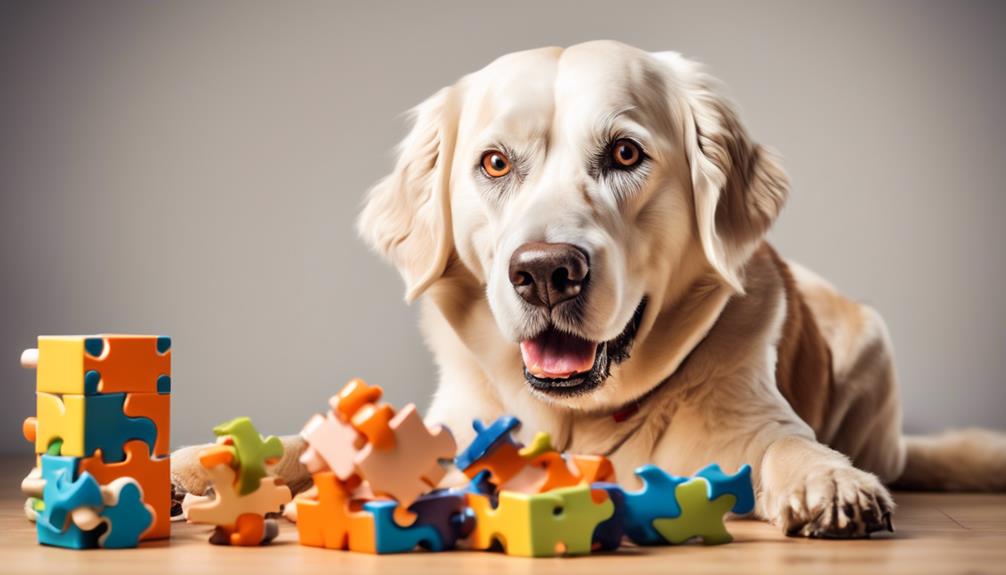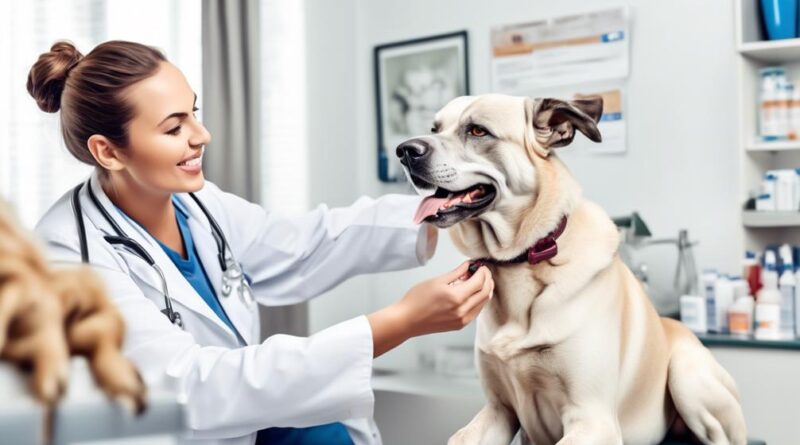What Does Senior Dog Health Care Involve?
As you watch your senior dog gracefully navigate the world around them, it's important to consider the unique elements of their health care. From tailored nutrition and exercise routines to regular veterinary check-ups and managing chronic conditions, senior dog health care involves a comprehensive approach to support their well-being in their golden years.
But what exactly does this involve, and how can you ensure your senior pup receives the best care possible? Let's explore the key aspects of senior dog health care and how you can proactively address their evolving needs for a fulfilling and comfortable life.
Nutrition for Senior Dogs
As your dog enters their senior years, it's essential to prioritize their nutrition to support their overall health and well-being. Weight management becomes crucial at this stage to prevent obesity, which can exacerbate joint issues and other health conditions.
You should consider switching to a senior-specific diet to help control your dog's weight. These diets are formulated with fewer calories and higher levels of essential nutrients. Additionally, dietary supplements such as glucosamine and omega-3 fatty acids can aid in joint health and cognitive function.
Senior dogs often experience changes in digestive health, so it's important to choose easily digestible foods. Look for diets containing high-quality proteins and fiber to support gastrointestinal function.
Hydration needs also increase as dogs age, making access to fresh water at all times essential. Consider incorporating wet food into their diet to help maintain adequate hydration levels.
To ensure your dog's nutritional needs are met, consult with your veterinarian to develop a tailored feeding plan. Regular check-ups can help monitor your dog's weight, dietary requirements, and any specific health concerns.
With the right nutrition, you can help your senior dog maintain a healthy weight, support their digestive health, and meet their increased hydration needs, ultimately contributing to a better quality of life in their golden years.
Exercise and Mental Stimulation
To ensure your senior dog's overall well-being, prioritize regular exercise and mental stimulation to maintain their physical and cognitive health. Indoor activities and enrichment play a crucial role in keeping your senior dog active and mentally engaged. Engaging in interactive playtime and providing mental enrichment activities are essential for the well-being of your aging canine companion.
As your dog ages, their energy levels and mobility may decrease, making indoor activities a great option. Activities such as hide-and-seek with treats, puzzle toys, and gentle indoor games can provide mental stimulation and help maintain their cognitive function. These activities aren't only physically beneficial but also serve as mental enrichment, keeping your senior dog's mind sharp and engaged.
Senior dog playtime is an important aspect of their routine. Interactive play, such as gentle tug-of-war or fetch, can help them stay active and maintain muscle tone. Additionally, the interaction during playtime provides mental stimulation and reinforces the bond between you and your senior dog. It's important to tailor these activities to your dog's individual capabilities and preferences, ensuring they get the exercise they need without overexertion.
Regular Veterinary Check-ups
Regular veterinary check-ups ensure your senior dog's health is monitored and any potential issues are addressed promptly. These check-ups play a crucial role in maintaining your dog's overall well-being as they age.
Here are three key aspects of regular veterinary check-ups for senior dogs:
- Preventive Care and Vaccinations: During check-ups, your vet will ensure that your senior dog is up to date on all necessary vaccinations. Additionally, they'll provide preventive care measures such as flea, tick, and heartworm prevention to safeguard your dog's health.
- Senior-Specific Screenings and Diagnostics: As part of the check-up, your vet will conduct senior-specific screenings and diagnostics to detect any age-related health issues early. These may include blood tests to check for organ function, urinalysis to assess kidney health, and screenings for conditions such as arthritis or diabetes. Early detection can lead to more effective management of these conditions.
- Nutritional and Lifestyle Guidance: Regular check-ups provide an opportunity for your vet to offer tailored nutritional and lifestyle advice for your senior dog. As dogs age, their dietary and exercise needs may change, and your vet can provide recommendations to ensure your senior dog remains healthy and active.
Dental Care and Hygiene
If you've been ensuring your senior dog's overall well-being through regular veterinary check-ups, it's essential to prioritize their dental care and hygiene as well. Just like humans, dogs require regular dental cleanings to maintain good oral health. Dental cleanings performed by a veterinarian involve removing plaque and tartar buildup, which can lead to gum disease and tooth decay if left untreated. Additionally, tooth extractions may be necessary for senior dogs with severe dental issues. It's important to address any signs of oral health problems early on to prevent discomfort and further complications.
Gum disease prevention is crucial for senior dogs. Poor dental hygiene can lead to gum disease, which not only affects the mouth but can also have systemic effects on a dog's overall health. To prevent gum disease, regular toothbrushing with dog-friendly toothpaste and dental chews can help reduce plaque and tartar buildup. Your veterinarian can provide guidance on proper dental care techniques and recommend suitable products for your senior dog.
Managing Chronic Conditions
Maintain your senior dog's health by actively managing any chronic conditions they may have, ensuring they receive appropriate treatment and care. When it comes to managing chronic conditions in senior dogs, there are a few key aspects to consider:
- Pain Management and Holistic Approaches: As dogs age, they may develop chronic conditions such as arthritis or degenerative joint disease, leading to discomfort and reduced mobility. It's essential to work closely with your veterinarian to develop a pain management plan tailored to your dog's specific needs. In addition to conventional medications, holistic approaches like acupuncture, physical therapy, or dietary supplements can complement traditional treatments, enhancing your dog's overall well-being.
- Home Care and Caregiver Support: Providing home care for a senior dog with chronic conditions involves creating a comfortable and safe environment. This may include using orthopedic beds, ramps to assist with mobility, or non-slip flooring to prevent accidental falls. Moreover, as a caregiver, it's crucial to offer emotional support and companionship to alleviate your dog's stress and anxiety. Additionally, seek support from your veterinarian or support groups to ensure you have the necessary resources and guidance to provide the best care for your senior dog.
Joint and Mobility Support
To help your senior dog maintain mobility and joint health, consider incorporating regular low-impact exercises and joint-supporting supplements into their daily routine.
Weight management plays a crucial role in reducing stress on your dog's joints. Excess weight can exacerbate joint pain and stiffness, so maintaining a healthy weight through a balanced diet and regular exercise is essential for joint health.
Additionally, supplements such as glucosamine and chondroitin can aid in supporting joint function and reducing inflammation. These supplements can be particularly beneficial for senior dogs experiencing joint discomfort.
Pain management is also crucial in supporting your senior dog's joint health. If your dog is showing signs of joint pain or stiffness, consult your veterinarian for appropriate pain management options. They may recommend medications or other interventions to alleviate discomfort and improve mobility.
Incorporating physical therapy into your senior dog's routine can also be beneficial for joint and mobility support. Physical therapy exercises can help maintain and improve your dog's range of motion, muscle strength, and overall joint function. Your veterinarian or a certified canine physical therapist can guide you in developing a tailored physical therapy plan for your senior dog.
Cognitive Function and Behavior

Improving your senior dog's cognitive function and behavior can be achieved through mental stimulation and enrichment activities. As dogs age, their brain health and cognitive function may decline, affecting their behavior and overall well-being. To support your senior dog's cognitive function and behavior, consider the following:
- Mental Stimulation: Engage your senior dog in mentally stimulating activities such as puzzle toys, interactive games, and obedience training. These activities can help keep their brain active and responsive, slowing down the aging process and maintaining cognitive function.
- Enrichment Activities: Provide enrichment activities that cater to your dog's senses, such as scent work, exploring new environments, and interactive feeding games. Enrichment activities can help reduce anxiety, prevent cognitive decline, and promote positive behaviors in senior dogs.
- Regular Exercise: Physical activity isn't only beneficial for your dog's physical health but also for their cognitive function. Take your senior dog for regular walks, gentle play sessions, and other low-impact exercises to stimulate their mind and maintain their cognitive abilities.
End-of-Life Care and Decision Making
Considering your senior dog's well-being in their final stage of life involves making tough decisions and providing compassionate care. As your dog's health declines, it's important to assess their quality of life and consider hospice care.
Hospice care focuses on keeping your senior dog comfortable and pain-free during their final days. This may involve medication management, physical therapy, and providing a peaceful environment. It's crucial to monitor your dog's happiness and ensure they're still able to engage in activities they enjoy.
Euthanasia is a difficult decision that many pet owners may face. It's essential to consult with your veterinarian to discuss the options and consider your dog's well-being. Quality of life assessments can help determine if euthanasia is the most compassionate choice.
Grief support is also an important aspect of end-of-life care. Many pet owners experience intense emotions when their senior dog reaches the end of their life. Seeking support from friends, family, or pet loss support groups can help you cope with the grief and make the best decisions for your beloved pet.
Frequently Asked Questions
What Are Some Common Age-Related Behavior Changes in Senior Dogs?
As your dog ages, you may notice changes in their behavior such as altered sleep patterns and cognitive decline. It's important to make nutrition and exercise modifications to accommodate these age-related changes for their overall well-being.
How Can I Support My Senior Dog's Emotional Well-Being as They Age?
To support your senior dog's emotional well-being as they age, incorporate enrichment activities like puzzle toys, gentle exercise, and mental stimulation. Spend quality time together, provide comfort, and maintain a consistent routine to promote their happiness.
What Are Some Alternative Therapies or Treatments for Senior Dogs With Chronic Conditions?
For senior dogs with chronic conditions, alternative therapies like acupuncture therapy and holistic care can provide relief. These treatments focus on the whole body and can complement traditional veterinary care to improve your dog's well-being.
What Are Some Signs That My Senior Dog May Be Experiencing Pain or Discomfort?
If your senior dog seems stiff, reluctant to move, or shows changes in behavior, they may be experiencing pain or discomfort. Consult a vet for pain management and consider enriching their environment to support mobility and cognitive function.
How Can I Help My Senior Dog Maintain Their Independence and Quality of Life as They Age?
To help your senior dog maintain independence and quality of life as they age, focus on senior dog exercise and enrichment. Regular walks, mental stimulation, and interactive toys can promote physical and mental well-being.
Conclusion
Taking care of a senior dog involves a combination of proper nutrition, regular exercise, and medical attention. By providing a balanced diet, regular vet check-ups, and managing any chronic conditions, you can ensure your elderly pup's health and wellbeing.
It's also important to keep them mentally stimulated, maintain dental hygiene, and provide support for their joints and mobility. As your dog ages, it's essential to be mindful of their changing needs and provide the best care possible.
